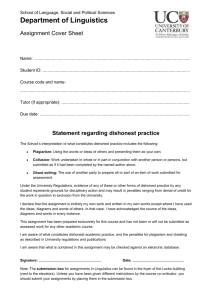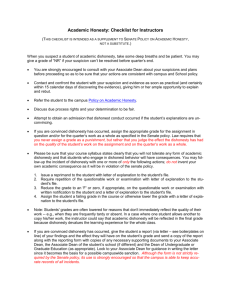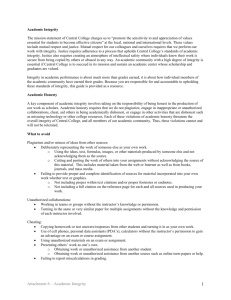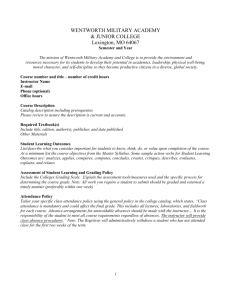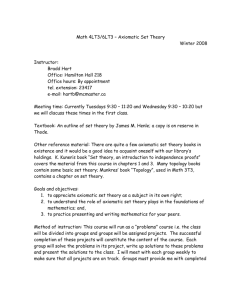ISE & D1S
advertisement
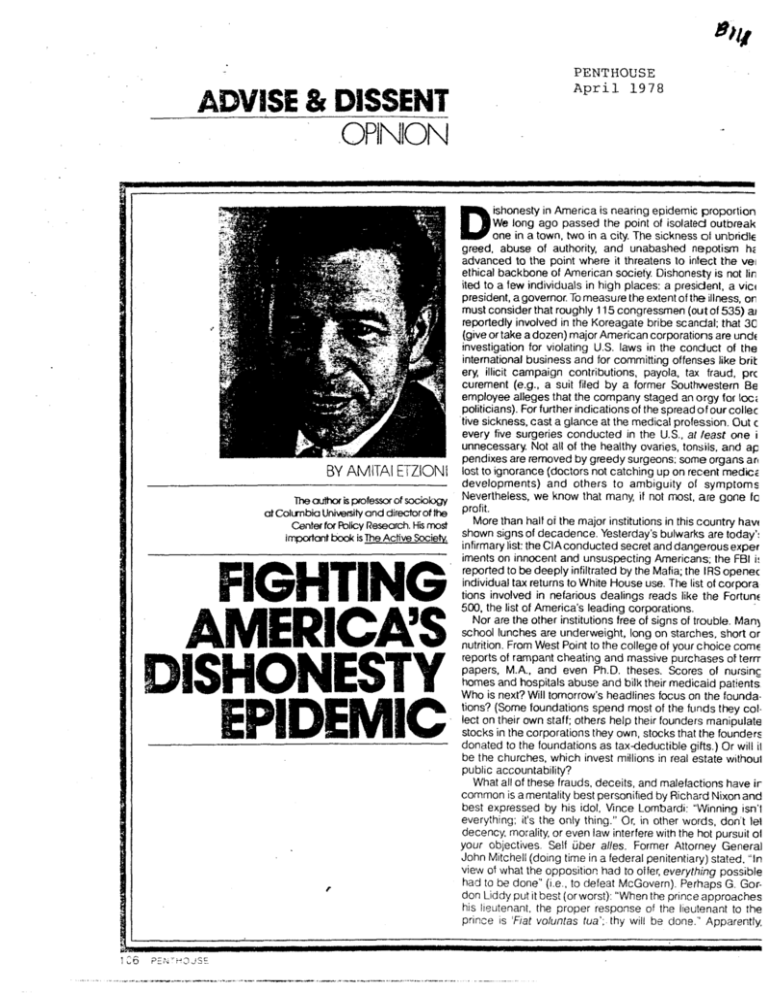
PENTHOUSE ISE & D1S April 1 9 7 8 OPINION ishonesty in America is nearing epidemic proportion We long ago passed the point of isolated outbreak one in a town, two in a city. The sickness of unbridk greed, abuse of authority, and unabashed nepotism h: advanced to the point where it threatens to intect the vei ethical backbone of American society. Dishonesty is not lin ited to a few individuals in high places: a president, a vicc president, a governor. To measufe the extent of the illness, on must consider that roughly 115 congressmen (out of 535) ar reportedly involved in the Koreagate bribe scandal; that 3 C (give or take a dozen) major American corporations are undc investigation for violating U.S. laws in the conduct of the international business and for committing offenses like brit ery, illicit campaign contributions, payola, tax fraud, prc curement (e.g., a suit filed by a former Southwestern Be employee alleges that the company staged an orgy fat loc; politicians). For further indications of the spread of our collec l v e sickness, cast a glance at the medical profession. Out c every five surgeries conducted in the U.S., at least one i unnecessary. Not all of the healthy ovaries, tonsiis. and ap pendixes are removed by greedy surgeons; some organs an BY AM ITA1 ETZIONI lost to ignorance (doctors not catching up on recent medic: developments) and others to ambiguity of symptoms The author is profemof s o c i o ~ Nevertheless, we know that many, i f not most, are gone fa at Colunbia University and directorof the profit. More than half o i the major institutions in this country havt Center for Policy Research. His most shown signs of decadence. Yesterday's bulwarks are today': important bock is The Active Sociely infirmary list: the ClAconducted secret and dangerous exper iments on innocent and unsuspecting Americans; the FBI i: reported to be deeply infiltrated by the Mafia; the IRS openec individual tax returns to White House use. The list of corpora tions involved in nefarious dealings reads like the Fortune 500. the list of America's leading corporations. Nor are the other institutions free of signs of trouble. Man) school lunches are underweight, long on starches, short or nutrition. From West Point to the college of your choice come reports of rampant cheating and massive purchases of term papers, M.A.. and even Ph.D. theses. Scores of nursinc homes and hospitals abuse and bilk their medicaid patients Who is next? Will tomorrow's headlines focus on the founda. tions? (Some foundations spend most of the funds they cot. lect on their own staff; others help their founders manipulate stocks in the corporations they own, stocks that the founder5 donated to the foundations as taxdeductible gifts.) Or will ii be the churches, which invest millions in real estate withoul public accountability? What all of these frauds, deceits, and malefactions have ir common is a mentality best personified by Richard Nixon and best expressed by his idol, Vince Lombardi: "Winning isn'i everything; it's the only thing." Or, in other words, don't lei decency, morality, or even law interfere with the hot pursuit 01 your objectives. Self uber alles. Former Attorney General John Mitchell (doing time in a federal penitentiary)stated. "In view of what the oppositior: had to offer, everything possible had to be done" (Le., to defeat McGovern). Perhaps G. Gordon Liddy put it best (orworst): "When the princeapproaches his lieutenant. the proper response of the lieutenant to the prince is :Fiat voluntas tua'; thy will be done." Apparentfy. G One public-opinion poll after the other shows that t h e majority of all adult Americans have tost trust in their government. Many youngsters say they never had it. 3 Liddy hadn't heard of the Nuremberg principle: only unethical persons follow orders without judging their morality. Behind such old-fashionedwords as honesty, morality, civic ethics, lies the sociological essence of social existence: the need to play by the rules, to limit the urges of each person to a responsibility to his fellow men and the community. If we all ruthlessly maximize our own good, the social world will turn into a jungle. Social existence and civility are not to be found in hiring ever more inspectors, auditors, and policemen. Every day there are billions of business, political, and personal transactions. N o amount of personnel could possibly check them all and enforce the rules. Besides, even if half of America were to turn inspector to keep the other half honest, who would inspect the inspectors? Society must therefore rely for its first line of defense against this plague of dishonesty on its members' voluntary compliance with what is moral and legal. This must be accomplished through ethical upbringing, education, example, and community endorsement of honesty and condemnation of abuse. When these principles are well established, society's second line of defense, that of inspection and policing, can be brought to bear on the offenders, kept to a small number by the first line. True, some will slip through both lines, but the combination of the two suffices to isolate dishonesty and sustain civic ethics. In our present degeneratingcondition the first line has become thin and weak, while the second has become overloaded and ineffectual. As more and more acts of dishonesty go undiscovered and unpunished, as more "get away with murder," so others are more tempted to overstep the limits of probity-and the entire societal body strains toward the breaking point. What must be reestablishedand sustained isnot a specific code of behavior, a God-given (or Washington-promulgated) list of dos and don'ts. Nor is it the "never tell a lie," God-fearing religion. premarital chastity, monogamy, honor, country, and the other old virtues. What is considered honest or ethical changes with time, and there is room for new conceptsof right and wrong. However, people living together in a society must observe certain restraints in their behavior toward one another in order to keep the societal body alive and well. None of us can pursue his own endswithout considerationfor those around him. There is no winner in a horse race in which the riders all knife each other coming down the home stretch. It can be argued that our wanton competitive drive has its roots in American history. America was, after all, a nation of immigrants and settlers who had to struggie against harsh and forbidding conditions merely to eke out a livelihood. Our ancestors, therefore, tended to place a premium on "making it," without too much soul-searching about how. But this explanation is far too simplistic. Americans, despite their competitive zeal, have, through the years, drawn on religious traditions, humanistic education, and a firm commitment to the Constitution (a government of laws, not of men) to temper the drive for individual success and to place it in a civil context. True, there have always been the Robert Vescos, Si!ly Sol Esteses, and Bobby Bakers, and their antecedents of zxiiargenerations. But they have been critickzed, not for their succi:-. but for how they made it. In recent years, however, the sense of responsibility to society, the willingness to play by the rules, to advance honestly, has waned considerably. It is being replaced by a selfish, egocentric. and dishonest cult of "every man for himself." The reasons for this weakening of the moral tissue are manifold. Corruption in high places has a demoralizing effect on society's lower echelons. Thus, if the president of the United States submits a fraudulent tax return. ordinary citizens are sorely tempted to do the same. Second, recent years have seen a massive increase in government spending. Copious funds-a cool $ 7 13 billion per year-flow through welfare, medicare. medicaid, and other programs, with spotty supervision at best. virtually inviting corruption of public officials, recipients. doctors, and anyone else who can dip into the public till. The justice system, supposedly society's second line of defense, has become so overloaded that most offenders don't get caught; and if caught, they often are not convicted; and if punished-not harshly. All of this further undermines the motivation to play by the rules. No wonder that one public-opinion poll after the other shows that the majority of all adult Americans have lost trust in their government. Many youngsters say they never had it. Yet there are signs in America today of a reaction, a demand for new civility, higher honesty. Rather like a sick body mustering its antibodies. the nation seeks reform. It was such a yearning that helped carry moralist Jimmy Carter into the White House. Nevertheless, the president has yet to fashion new tools that would both sustain and inspire the nation to reassert its voluntary commitment to civic ethics. What is now needed is a thoroughgoing cleanup and then-but not before-a "closing of the books." To many, "closing the books" connotes whitewashing and new pardons, but this is precisely what must be avoided. Any attempt to "forget Watergate," to "turn over a new leaf," that is not preceded by a massive cleanup will lead only to renewed eruptions of revelations, scandals, cynicism. What is needed first is the secular counterpart to the religious expiation of sin or atonement. The suggestion does not spring from any fundamentalist or "born again'' orientation, but rather from the sociological study that suggests that reinstatement of the dishonest without some sacrifice is not possible because of past offenses. At present, we have no method of enabling dishonest Americans to do penance and then truly to shed the past. With this in mind, the president should propose and Congress should enact a "New Departures in Honesty Bill" whereby: (a) All persons who committed a dishonest act and who make rzsiittition by July 1, 1978, will be considered to have paid their debt to society and be clean. (b) Those who fear that they may have committed dishonest acts in which there are no clear rules of conduct may apply for Clarificationof Status and will not b i deemed dishonest if the ambiguity is plausible; if not. rule (a) will appiy (c) Dishonest acts that involve less than tweniy-five dollars and were committed prior to July 1 , 1978. cvifl be paidoned after that date. (d) Those serving in public office will be held !r3 especially CCR i l W ' E D ov P A S F 1% ADVISE & CONTINUED FROM PAGE 107 high standards of accountability but prior conduct in private tifewill be judged by the prevailing standards of the community in which the transgressions occurred, and at the time they occurred. (e) All dishonest acts committed after July 1, 1978, will be punished severely, in accordance with a new code of ethics to be introduced. For example, legislators will be allowed no outside income of any kind. Government officials will be prohibited from accepting jobs from industries they regulated for at least three years after they have left office. Doctors caught making fraudulent medicaid claims will be slapped with five-year prison terms, as will auditors, and so on. 'Such a bill would generate a dramatic discharge of past transgressions, and its cleansing effect on our body society would be forcible. It would provide the mechanism through which our society could close the books on the Watergate era and turn over a new leaf of higher civic standards. If we don't have a clear demarcation line and an institutional opportunity for atonement and restitution, skeletons will continue to rattle in countless closets, and they are sure to be discovered, keeping the stench of decay alive in America. True, such a bill will not wipe out dishonesty; societies do not turn around like marching bands on football fields. But it may well do away with the feverish. combination of uncontrolled pursuit of greed and unfettered abuse of power and return dishonesty to "normal" or near-normal levels: that of isolated pockets at the margin ofsociety, in some ill corners, rather than the present, almost epidemic proportions. Moreover, once the feverishness is overcome, the normal processes-now overwhelmed-can, again, do their share. Educators, parents, civic associations, professional associations, churches, and community groups can again serve as the society's mainstays of civic ethic. While the above reforms take careful aim at the dishonesty apparent at all levels of American society, special consideration must be given to governmental (and particularly presidential) reform lest we cure all the spots the illness has spread to but leave ill its core. So far few of the required institutional reforms have been carried out. However solid the integrity of the individual in the Oval Office, it seems sociologically unwise to rely so much on one man's trustworthiness, rather than relying more on institutionalized, procedural safeguards. As yet, nothing has come from the numerous proposals to secure an independent prosecutor, so that a future president will not be able simply to dismiss those who prod too deeply into executive abuses. On the contrary, the appointment of an old friend of the president as the attorney general is a step backward from the scholarly and indepen- dent Edward Levi to pre-Watergate habits. Moreover. voices have been raised to stop "torturing ourselves" with revelations of dishonest acts and calls for reforms. Fortune (February 1977) states: "Christmas presents for the cops? Can it really be that the long saga of corporate guilt and contrition IS now turning to such paltry confessions? If so, the product will never sell. The era of breast-beating may be coming to.an end." Elliot L. Richardson writes in the New York Times about a "sexless orgy of morality" in which. following numerous reforms well in hand, we turn to unnecessary. dull, piddling examinations of our public officials. invading their privacy and violating I sound judgment and good. taste. Irving : Kristol worries that excesses o f postWatergate morality will be the seeds of tomorrow's problems. There have been excessesthat providc fair, convenient targets for those anxious tc put behind us the exposes;. strains, anc conflict that reform entails. But or;e mus realize that the post-Watergate reform movement-part public sentiment, pari morality play, part new politics-like all so. cia1 movements, cannot be expected tc proceed with the meticulous precision 01 the Supreme Court or a scientific investigation. A certain amount of moralism, emotionalism. even sensationalism, may well be an inevitable, albeit small, price to pay for mass support of a massive reform. I say "small price," because implicit in the Watergate-has-gone-too-far argument 'is the allegation that the current obsession with public morality is, or threatens to be, our era's McCarthyism. In fact, thsre has been little, if any, McCarthy-style "wiichhunting" and pers5cution of innocent parties. McCarthyism was marked by vague accusations and judgments made in secret so that individuals could not readily defend themselves. In contrast, those caught up in the Watergate backlash have been confronted with specific, welldocumented charges, and. their legal rights have been fully honored. The targets of McCarthyism were subjected to harsh penalties for trivial or imagined offenses. The Watergate defendants have been dealt with quite leniently-if not granted an outright pardon. In brief, the "postWatergate morality" is far from a vindictive free-for-all of moralistic accusation and punishment. On the contrary. If we stop now and return to business as usual, without first instituting reforms and providing an opportunity for past transgressors to come clean. the illness of distrust in government, professions, businesses, and ultimately each other will continue to fester until it reduces us to a North American, modern-day Babylon. Let reform be judicious but unrelenting. Let our pursuit of an honest America not be deterred by the number of skeletons and places where they lie. There is enocgh native vitality in American society for us to face up to our sordid past for a more wholesome future. -
